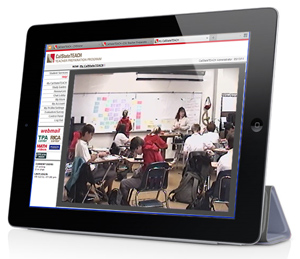Innovative Use of Technology at California State University: CalStateTEACH and iPads

Teresa K. DeBacker is a member of AACTE’s Committee on Innovation and Technology, which selects winners for the Association’s Best Practice Award for the Innovative Use of Technology. This post highlights the work of the 2014 award winner, CalStateTEACH.
In 2010, CalStateTEACH launched a one-to-one mobile learning initiative using iPads. Introduction of this mobile technology led to transformation of every aspect of the program, from the reconceptualization of curriculum and redefinition of candidate outcomes to the personalization of faculty development and creation of e-supervision tools. This transformation was described in the award-winning application for the 2014 AACTE Best Practice Award for the Innovative Use of Technology. The award recognizes outstanding initiatives that are based in the technological pedagogical content knowledge (TPACK) model of teacher knowledge.

CalStateTEACH is a statewide, public university, online, site-supported teacher preparation program developed to provide access and equity to teacher candidates from diverse, underserved rural and urban schools. The goal of introducing iPads into the program was to support the preparation of creative, collaborative, and reflective teachers who understand the important relationships among technology, content, and pedagogy for diverse students and underserved schools. Through introduction of this mobile technology, CalStateTEACH aimed to modernize the curriculum, optimize the use of technology as a tool for learning and teaching, and reduce the digital divide across urban and rural partner schools.
In the CalStateTEACH program, iPads provide continuous access to the tools of teacher preparation and are the candidates’ window to both personal and professional networks. The iPad represents the hub of instruction in academic course work, as well as in the classrooms were candidates are teaching. Candidates utilize the iPad to present content to students and to support students in making and demonstrating their own content. Project-based learning facilitated with collaborative digital tools is a key vehicle to engage teacher candidates and their students in critical thinking, creativity, and collaboration—core 21st-century learning skills.
iPad-supported supervision is a powerful tool for both teacher candidates and their faculty supervisors, whether occurring synchronously (using videoconferencing software) or asynchronously (using recorded video). Additionally, faculty share in leadership through the creation of iBooks and iTunes U courses, creating new models to foster pedagogical skills and reinforced core and interdisciplinary content knowledge. To further support the success of the initiative, CalStateTEACH provides professional development for PK-12 teachers in partner schools, leading to new models of clinical practice.
Learn more about the AACTE Best Practice Award for Innovative Use of Technology here.
For more information about the CalStateTEACH mobile learning initiative, visit http://www.calstateteach.net/ or contact Sharon Russell at srussell@calstate.edu.
Tags: technology






